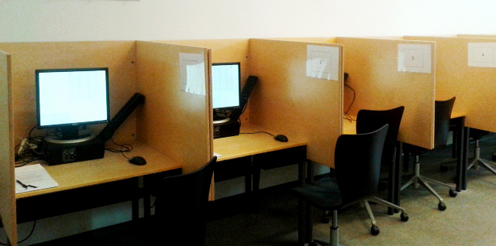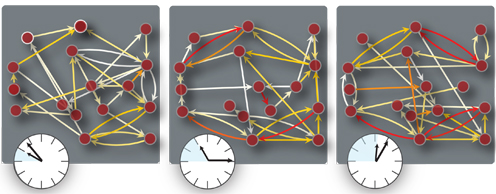Trust fosters networking and knowledge sharing
A group of researchers from the Niels Bohr Institute have examined how a communication network can arise within a new experiment called Expert Game. They discovered that the driving mechanism for the emergence of communication network was trust building between people. The results are published in the scientific journal, Proceedings of the National Academy of Sciences of the USA, PNAS.

During the experiment, participants spent four hours in the laboratory, where they could only communicate through a limited number of defined and standardised messages in the form of emails and all communication was monitored by a specially designed programme. By analysing data from the experiment, the researchers found that a strong communication network was created and that information in the network was controlled by the mutual trust between participants. (Photo: Jan Haerter)
Today, more and more are working in knowledge-based jobs and solve very complex tasks. If you are challenged on the job to solve a task that is beyond your area of expertise, you will often seek guidance from others. And if you then return the favour and share your knowledge with colleagues, helping them to solve a problem, they will be grateful for the help. This type of knowledge sharing where ‘experts help experts’ increases overall efficiency and promotes innovation. But people are often so pressed for time that they simply do not have the time to be helpful, as they also need to take care of their own duties. But who is happy to share their knowledge with others? And what does it take for someone to do it?
Forced to prioritise
“We wanted to investigate how knowledge was shared and if a robust communication network would emerge in a setting where people were forced to prioritize between doing their own job versus helping others with their task” explains Kristian Moss Bendtsen, PhD in biophysics, Niels Bohr Institute, University of Copenhagen.
The three researchers, Kristian Moss Bendtsen, Florian Uekermann and Jan Haerter, all from the Center for Models of Life at Niels Bohr Institute at the University of Copenhagen, therefore developed a new experiment called ‘The Expert Game’.
“In real organisations, questionnaires and other indirect methods have been used to measure knowledge sharing and collaboration. We wanted to have a directly measurable, quantitative experiment that mimics a professional work situation, but which removes some of the complications from the real world, so we created ‘The Expert Game’ experiment,” explains Jan Haerter, assistant professor in the Center for Models of Life at the Niels Bohr Institute.
16 people participated in the experiment. During the experiment, participants spent four hours in the laboratory, where they could only communicate through a limited number of defined and standardised messages similar to emails and all communication was monitored by a specially designed programme.

Links in colours from yellow to red show increasing strength of preference between players (the circles), the three panels (left to right) are for different stages of the game, note the symbolic clocks. The researchers measured, that the focus between players became stronger after about one hour of playing, reflected by more red arrows in the second and third plot (middle and right) compared to the left. (Proceedings of the National Academy of Sciences of the USA, PNAS)
Trust creates a greater flow of information
The experiment was designed so that it connects information with monetary profit. The researchers analysed the data and found that strong network connections were created between the participants. By then applying the theoretical model to process the behaviour of the participants in the experiment, the scientists assessed the extent of the social relations that were formed.
“Our experiment is constructed such that it ties information to monetary gain, but when we discovered how to further link information flow with trust, we got really excited, because we knew that this would allow us to investigate the formation of so called social capital.”, explains Jan Haerter.
‘Social capital’ is an abstract term that captures the ability of social ties to generate economic advantage. In the social sciences, the concept of social capital has long been studied, but it has proven hard to measure.
A formula for helpfulness
Using their theoretical model to reproduce the participants’ experimental behavior, the authors then went on to quantify the formation of social capital. They conclude that formation of social capital is both a matter of time and the investment one makes in terms of helpful messages.
Overall, the experiment showed that even simple, standardised and impersonal emails create trusting relationships that promote knowledge sharing.
As the researchers put it, the experiment could therefore be seen as a step towards a more measurable understanding of knowledge sharing and the creation of trust in professional contexts. However, there is still a long way to go – both in terms of larger and longer experiments and in terms of applying the method to the real world.

Kristian Moss Bendtsen, researcher, Center for Models of Life, Niels Bohr Institute, University of Copenhagen, Kmoss@nbi.dk, +45 4096-1521
Jan Haerter, researcher, Center for Models of Life, Niels Bohr Institute, University of Copenhagen, haerter@nbi.dk, +34 6042-56282
